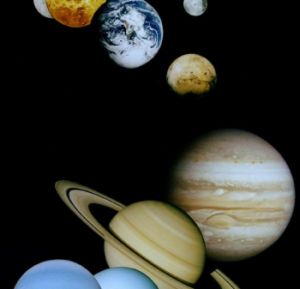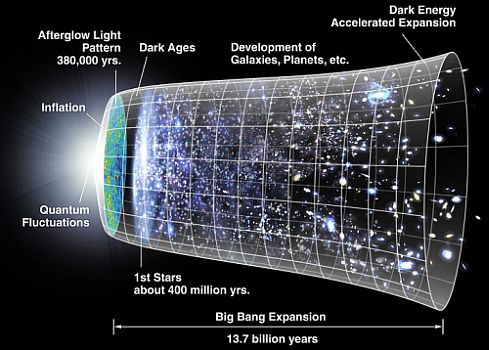Origin of the elements—Bible vs the big bang
Today’s feedback deals with some aspects of big bang theory, such as the origin of the chemical elements, the Cosmic Microwave Background Radiation (CMBR), and the expansion of the universe. Creationist physicist Dr Russell Humphreys and CMI’s Dr Jonathan Sarfati respond.

Ronald B. from the United States writes:
I am an evangelical Christian, and believe in the Bible’s literacy. However, [a well-known and competent creationist astrophysicist], to whom I have written repeatedly, has never answered this question. My question: how do we explain the creation of heavy elements except from the furnaces of stars—for which scientific evidence from many sources is consistent. Secondly, the arrangement of planets, and their iron core/gaseous nature are very compatible with a solar genesis formation of the planets, making earth appear to be un-exceptional.
-We need to defend our beliefs here as well as in the already defunct field of “evolution.”
PLEASE HELP!
Creationist physicist Dr Russell Humphreys responds:
Dear Dr B.,
I just realized that there are very clear answers in Scripture to your question about whether the origin of heavy elements was somewhat naturalistic or not. I presume you realize that to astronomers and astrophysicists, a “heavy” element is any element heavier than beryllium or lithium, because the alleged Big Bang is not supposed to have been able to produce anything heavier than that. So, for example, carbon, nitrogen, and oxygen are heavy elements. Astrophysicists who are naturalistic think that heavy elements were produced by first generation-stars that existed long enough to become supernovas, spewing out heavy elements produced by nuclear processes in the star’s cores. They have been largely silent about discoveries of carbon, nitrogen, and oxygen spectral lines from very high-redshift objects, presumably coming from the era when first-generation stars were very young, not having produced any supernovas yet.
I think you probably know much of that. My main point is that oxygen is a heavy element. Yet Scripture indicates that God created oxygen, as part of literal water, in the first instant. See Genesis 1:2 and read it literally, as I presume you were trying to say you do. Also, see 2 Peter 3:5 in the Greek or the New American Standard translation:
“… the earth was formed out of water and by water.”
Instantaneous creation of oxygen is not in any way natural. So God produced at least one heavy element supernaturally. I’ve based a very successful theory on how God started up the magnetic fields of planets on a water creation. See my article, The Creation of Cosmic Magnetic Fields.
Next notice that God transformed some of the water to many heavy elements within three ordinary-length days, after which the dry land of earth’s continents existed (Genesis 1:9). Such a rapid transformation is not natural.
Last, notice that Jesus Christ, while He was on earth, created some heavy elements supernaturally, carbon, nitrogen, and oxygen at least. See John 2:7–11 and 6:9–14.
Thus, I don’t feel compelled to explain the existence of heavy elements by some semi-naturalistic nucleosynthesis process. God may have done that for some of the heavy elements, but He definitely didn’t make all of them that way.
Sincerely in Christ,
Russ Humphreys
Ronald B. responded to express his thanks:
Dear Creation Ministries International,
Thank you very much, brothers in Christ. It was most kind of Dr. Humphreys to provide these incisive insights (my reference: http://www.conservapedia.com/Russell_Humphreys).
Augustine is noted to have said that God could have created everything in one day. God is not limited in any way.
It is crucial to note, as Dr. Humphreys notes, that there is Scriptural evidence that heavy elements were necessarily on earth in its initial state, before the stars were made. His caution, also, about semi-naturalism is most appropriate.
Astrophysicists measure current activity, and infer activity from the spectra of distant objects. Nonetheless, numerous assumptions are made in their scientific model’s indirect data-driven method, which infers from an incredible history, which has no coherent theory of time, and which cannot account for over 95% of the matter in the universe. Evolution, in a local and more obvious way, has all too obvious irreconcilable flaws, including genetic entropy and the modeling of internal organ structures.
If we cannot believe in a God of any and all miracles, then in Whom do we believe? If we must demand explanatory evidence for everything we think we know, where does that put our faith? If we think that we are capable of understanding the entire mystery of creation and the universe, does that not arrogate to ourselves the role of God?
Thank you, again, for reminding me of human limitation in our innately flawed natural understanding, and for keeping me from the lure of scientism.
Cordially, in Christ,
Ronald S. B., M.D.
Fiona S. from Australia writes:
I attended an astrophysics talk last night. The guest speaker said that it was the ‘pattern’ of the CMBR (cosmic microwave background radiation) that was more important than its temperature as it was the pattern to be expected by sound waves. She also said that the ‘structure’ of the present universe is due to the sound waves which transversed the early universe—from the Big Bang explosion— when the matter was still dense enough to allow sound to travel. She attributed the initial fluctuations of density to these sound waves—and hence inferred that’s how we got our galaxies. Could an astrophysicist in your organisation please comment on the feasibility of this relationship? (As a friendly ‘aside’, I realise that God ‘spoke’ but I also know that He didn’t use the Big Bang.)
CMI’s Dr Jonathan Sarfati responds:

Dear Fiona
Thank you for asking.
As usual, the arguments against the biblical teaching fall flat. Our site has a number of articles on this particular argument:
- CMBR evidence falls far short of proof of the big bang, and even fails basic logic: Nobel Prize for alleged big bang proof
- Such weak “evidence” would fail in other disciplines: WMAP proof of big bang fails normal radiological standards
- The uniformity of the CMBR is a huge light travel time problem for the big bang: Light-travel time: a problem for the big bang
Regards
Jonathan Sarfati
A.C. writes:
Dear Creation Ministries International,
I have a simple question, what do Christians need to think about the universe expanding and not static? Furthermore, is it true?
Sincerely,
A.
Dr Jonathan Sarfati responds
Dear Mr C.
Thank you for writing to CMI. We think that the Bible does not teach one way or the other. So for now, we would probably go for the expanding universe theory since that seems to be supported by the evidence, and doesn’t conflict with Scripture. This is our general policy on biblically neutral theories; cf. Should creationists accept quantum mechanics? You might also like to read the articles under What are some of the problems with the big bang hypothesis? and the key articles on that page.
Regards
Jonathan Sarfati



Readers’ comments
Comments are automatically closed 14 days after publication.